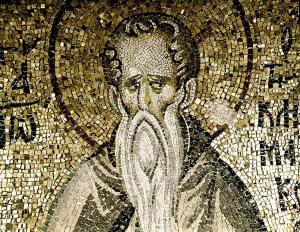
We have been told to avoid evil, and indeed, to expose what is evil, to bring it into the light: “Take no part in the unfruitful works of darkness, but instead expose them.” (Eph. 5:11 RSV) We must read this admonition as primarily something we should do with ourselves, that is, we should expose our own inner darkness to the light so that we can change our ways. We must not see it as an exhortation to go around exposing the works of others. We are to make sure what we do is upright and sound, and not become corrupted by the ways sin. As love is the way of light, the way of God, hate or malice is the way of darkness, the way of sin. Because sin does not exist in and of itself, but rather, acts as a parasite on what is good, malice, unsurprisingly, often takes on something which is good, uses it to justify itself, but in the end, proves to offer only a terrible perversion of that good. In this light, then, we should understand St. John Climacus when he tells us:
Malice is honesty perverted, a deluded thought, a lying disposition, perjury, and ambiguous words. Malice is a false heart, an abyss of cunning, deceit that has becomes habitual, pride that is second nature. It is the foe of humility, a fake penitence, mourning depleted, a refusal to confess, an insistence on getting one’s own way. It is the agent of lapses, a hindrance to resurrection, a tolerance of wrongdoing, false grief, false reverence. It is life gone diabolical.[1]
While malice corrupts the life of the one who embraces it, it tries to hide itself by using all kinds of clever arguments to justify itself, making it appear that its conclusions are necessary and logical. It suggest that if we go against what it has ordained, we are going against some sort of good which it has shown us we must preserve, but in reality, all it does is promote some perversion of the good instead of the good as it is in itself. It encourages us to be cruel to others justifying such cruelty by saying others have done something wrong, something worthy of condemnation, and our cruelty is not cruelty but their just punishment. While it is possible that it is right in its judgment that the other has done some wrong, it is certainly in the wrong with the kind of response it suggest, as what it suggest is not a proportional response which looks to the welfare of the person who needs correction (if, that is, they really need such correction), but rather, a disproportionate response which aims at their destruction.
Malice does not have us deny that we have faults of our own; indeed, to hide itself deep within our psyche, it encourages us to examine our minor faults and fix them so that we do not perceive our real problem, which is, we lack the love which we need to attain true virtue. Thus, many who are malicious will often seek to attain some level of piety, showing off their piety to others. That way, they can appear holy and hide from themselves and others the darkness which has consumed them and their life from within. This is why, reflecting on the fruit of malice, John Climacus was able to say it leads to fake penitence, getting in the way of the true reforms we need to engage to better ourselves.
To truly embrace the way of life, the way of the light, all the malice in our hearts must be dispelled, and all the darkness which we use to cover it so that it can fester and consume us from within must be cast aside by the light of truth, the truth which we should use to correct ourselves instead of becoming judgmental and condemn others. “A meek soul is a throne of simplicity, but a wrathful mind is a creator of evil.”[2] We must turn away from malice, from the pride which malice inspires, from the judgmental spirit of malice, and become humble and meek, for then we can begin to truly hunger and thirst for righteousness, for true righteousness is found in love and not in a legalism which knows no love.
“Evil is a deliberate kind of knowledge. Or, rather, it is a deformity of the devil. There is no truth in it. And it imagines it can avoid being detected by many.”[3] Evil uses facts to create falsehoods by imposing upon us a lens by which we interpret those facts, and through that lens, we establish ideologies which run contrary to the fullness of the truth itself. The devil can quote Scripture, but when the devil does so, it corrupts the meaning of the words and so what is said, even though what is quoted is true, is false. We can find something similar happening when many engage facts and figures: despite all the knowledge they have accumulated, they use it to promote some wrongdoing or evil, showing, what they know is itself not the truth but only a simulacra of it. The malice in their heart makes them think they can be clever, and in and through their cleverness, create truths out of facts, but all it does is have them create excuses to justify evil, and therefore, falsehoods. Some might be fooled, at least initially, by their reasoning, but such cleverness can only go so far and hide the malice inside for so long before it is revealed, and then, when it is revealed, when it is out in the open, the only one who is fooled is the one who wants to be fooled, which is often the malicious person themselves. This is why we must be heed the warning: “Fight to escape from your own cleverness. If you do, then you will find salvation and an uprightness through Jesus Christ our Lord.”[4] If we won’t heed that warning, we risk embracing more and more evil, more and more perversion of what is good, establishing a greater and greater lie for ourselves, a lie which will make us more and more diabolical, more and more like the devil. In the end, though our malice seeks the destruction of others, it will consume us from within and lead to our own annihilation instead. This is why it is important for us to heed the warning, to realize how malice has gotten us to rationalize evil, and to fight against it, so we can begin our journey towards perfection instead of its simulacra.
[1] St. John Climacus, The Ladder of Divine Ascent. Trans. Colm Luibheid and Norman Russell (New York: Paulist Press, 1982), 215 [Step 24].
[2] St. John Climacus, The Ladder of Divine Ascent, 215 [Step 24].
[3] St. John Climacus, The Ladder of Divine Ascent, 215 [Step 24].
[4] St. John Climacus, The Ladder of Divine Ascent, 217 [Step 24].
Stay in touch! Like A Little Bit of Nothing on Facebook.
If you liked what you read, please consider sharing it with your friends and family!
N.B.: While I read comments to moderate them, I rarely respond to them. If I don’t respond to your comment directly, don’t assume I am unthankful for it. I appreciate it. But I want readers to feel free to ask questions, and hopefully, dialogue with each other. I have shared what I wanted to say, though some responses will get a brief reply by me, or, if I find it interesting and something I can engage fully, as the foundation for another post. I have had many posts inspired or improved upon thanks to my readers.













